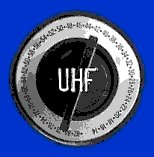

 |
 |
|
by Kevin Fennessy
When UHF began in Philadelphia, there were three independent stations: WKBS, WPHL-TV/17, and WIBF-TV/29. WIBF was owned by The Fox Brothers of Jenkintown, who also owned a small ethnic FM station, WIBF-FM/103.9; WPHL-TV's first attraction (while many people were deciding to go out and purchase a converter for the top of their TV set) was bullfights from Mexico along with antiquated cartoons from Japan like Tobor the 8th Man. UHF in Philadelphia started growing with afternoon children's programming, college basketball, and any sort of travelogue-type programming the three stations could get their hands on. All of the local deejays from WIBG and stations in the outlying areas of Philadelphia, were given opportunities to have their own weekly Bandstand-type show, including legends like Joe Niagara, Ed Hurst, and Allentown's Gene Kaye. WKBS had the weekly Hy Lit Show, where kids danced and Hyski exposed mostly hip R&B crossover acts. The program also aired on Kaiser's other owned stations in Detroit (WKBD-TV/50) and Boston (WKBG-TV/56). WKBS had a local host who did most of the on camera stuff
In 1972, Kaiser Industries sold a 22½% interest in WKBS -- along with WKBD-TV, WKBF-TV/61 Cleveland and KBHK-TV/44 San Francisco -- to Field Communications, acquiring a 77½% interest in Field's WFLD-TV/32 Chicago in the process. (The partnership subsequently bought out the Boston Globe's 10% interest in what was by then WLVI-TV/56.) When Kaiser liquidated itself in 1977, Field reacquired full ownership of the Chicago station and Kaiser's portion of the other four stations (two years previous, WKBF-TV had gone dark and the Kaiser/Field partnership ended up with 36% of WUAB/43 Lorain OH; at the time of the Kaiser liquidation WUAB was spun off to Gaylord Broadcasting). In 1982, a dispute between brothers Marshall and Frederick Field resulted in the liquidation of Field Communications and by June of the following year, WFLD-TV had been sold to Metromedia, WLVI-TV to Gannett and KBHK-TV to United Television. Facing a self-imposed deadline to dissolve the company, and with no one stepping forward to meet their asking price for channel 48, they decided to liquidate WKBS's assets, sign the station off the air, and surrender the license to the FCC ... which is what they did on the last day of August 1983, eighteen years to the day from its sign-on, making it the station that operated for the longest period of time before permanently going dark. (WKBD-TV was sold to Cox Communications by year's end; Kaiser's Los Angeles station, KBSC-TV/52, had not been part of the Field deal in 1972 and was sold to Oak Industries separately in 1975.)
I was Program Director of WHAM in Rochester at that time, but happened to be in town visiting family the night WKBS went off the air ... which was following some pre-season football game or some sporting event. The acting station manager came on and did a brief narrative about the circumstances leading to that moment, and ran a video where they panned around the building and every employee said goodbye. It was a shame, because WKBS raised a lot of kids with their children's programming, and following years of being dark, the successor occupant of channel 48 (WGTW-TV) never approached meaning anything to the population of Philadelphia at large. It was sold to Trinity Broadcasting in 2004. WKBS was a living breathing part of Philadelphia, which like WIBG, WFIL and more recently WWDB, will remain a fond memory. WKBS/48 sermonette and sign-off circa 1983, originally from the now-defunct siteTVSignOffs.com and now accessed via the Wayback Machine. This article originally appeared in Peter Q. George's "UHF Morgue" at his former RadioDXer site and is republished here with his permission. Reformatting and editing, plus clarification of the Kaiser-Field ownership details, by K.M. Richards. EXTERNAL LINKS

|
© World Radio History. Original site concept by Clarke Ingram. Site design and management by K.M. Richards.